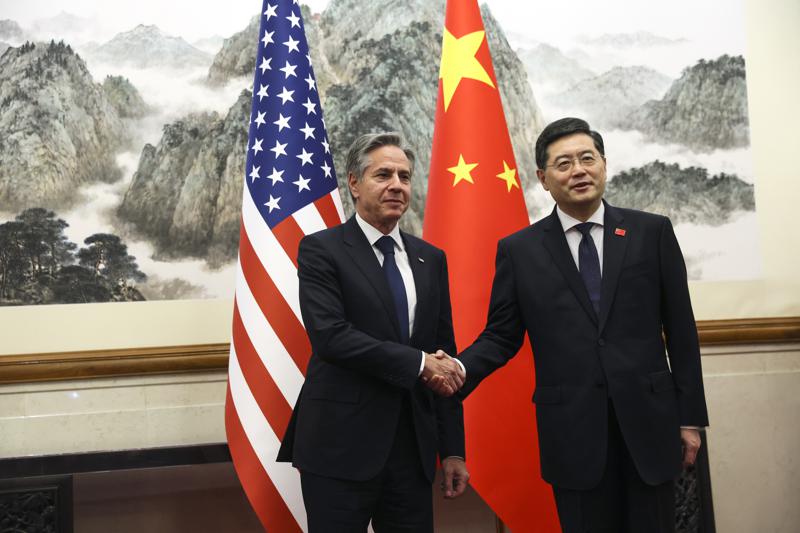BEIJING (AP) – US Secretary of State Anthony Blinken has launched a two-day diplomatic mission to Beijing to ease escalating tensions between the United States and China. These high-risk talks are aimed at addressing the growing concerns plaguing the world.
Mr. Blinken’s first official action was an extensive discussion with China’s Foreign Minister Qin Gang, followed by a working lunch. On Monday, he will hold further meetings with Qin, as well as China’s top diplomat, Wang Yi, and possibly President Xi Jinping.
Neither Blinken nor Qin made any important comments to reporters during the diplomatic talks at the Diaoyutai State Guesthouse. But with already strained relations between the two countries slowly deteriorating in recent years, prospects for significant progress during Mr Blinken’s visit remain slim. Ongoing disagreements have far-reaching implications for global security and stability, fueling hostilities and heightening tensions.
Blinken’s visit to China as a senior U.S. official since President Joe Biden took office will be the first by a secretary of state in five years.
Mr. Blinken’s visit to China was decided at a meeting between Mr. Biden and Mr. Xi in Bali last year. Originally scheduled for February, the visit was postponed after a Chinese reconnaissance balloon flying over the United States was spotted and subsequently shot down. The list of controversial issues and potential conflicts is extensive and includes trade ties with Taiwan, the human rights situation between China and Hong Kong, China’s military power in the South China Sea and Russia’s involvement in the war in Ukraine. .
In addition, Mr. Blinken calls on China to release imprisoned American citizens and take steps to curb the production and export of fentanyl precursors that contribute to the US opioid crisis.
U.S. officials have said Mr. Blinken will address these issues at the meeting, but neither side has shown any willingness to compromise its steadfast position.
Just before leaving for China, Mr. Blinken emphasized the importance of building and maintaining better lines of communication between the United States and China. He expressed his willingness to prevent competition between the two countries from escalating into conflict due to misunderstandings that should be avoided. Blinken recalled Biden and Xi pledged to improve communication to ensure clarity and prevent misunderstandings and misunderstandings.
In a meeting with Microsoft co-founder Bill Gates, Xi hinted that he may be willing to ease tensions. He said the United States and China can work together for the benefit of both countries and humanity as a whole.
Biden also expressed his desire to meet with Xi in the coming months to discuss their legitimate differences and find ways to live together.
Opportunities for such meetings could arise during the G20 summit in New Delhi in September or during the US-hosted Asia-Pacific Economic Cooperation Conference in San Francisco in November. Although Brinken’s first visit in February was cancelled, high-level talks have been held between the two countries. CIA Director William Burns visited China in May and China’s Trade Minister visited the United States. Biden’s national security adviser, Jake Sullivan, also met with Wang in Vienna in May.
These exchanges, however, have resulted in sporadic outbursts of hostile cross-strait rhetoric, intent in the Indo-Pacific region, China’s refusal to condemn Russia’s actions in Ukraine, and attempts to expand its surveillance capabilities globally. It has been undermined by US condemnation of the Chinese government’s efforts to Including Cuba.
Earlier this month, China’s defense minister declined a request from US Secretary of Defense Lloyd Austin to meet alongside a security symposium in Singapore, signaling continued grievances.
Mr Austin expressed confidence that he would eventually meet with the Chinese side, but admitted he was not at that stage yet. Underscoring the difficulty, China dismissed a report by a US security firm that attributed attacks on numerous public facilities and institutions around the world to hackers with ties to China. The allegations have been described as “outlandish and unprofessional.” China also accused the US government of carrying out the hacking attack and criticized the cybersecurity industry for its selective coverage.
In a similar exchange earlier this week, Mr. Qin called on the United States to respect China’s core concerns, including Taiwan’s autonomy, and to stop interfering in China’s internal affairs, while urging China’s sovereignty, security and It warned against acts that infringe on national security and development interests. China tarnishes the name of the competition.
Meanwhile, the national security advisers of the United States, Japan and the Philippines held their first joint meeting and agreed to strengthen defense cooperation. The move is aimed at countering China’s growing influence and ambitions.
At the same time, the Biden administration reached an agreement with Australia and Britain to deploy nuclear submarines to Australia. China is rapidly expanding its diplomatic presence, especially in the Indian and Pacific island nations, and plans to open at least five new embassies next year.
The contract is part of an 18-month nuclear partnership called AUKUS representing Australia, the UK and the US.
